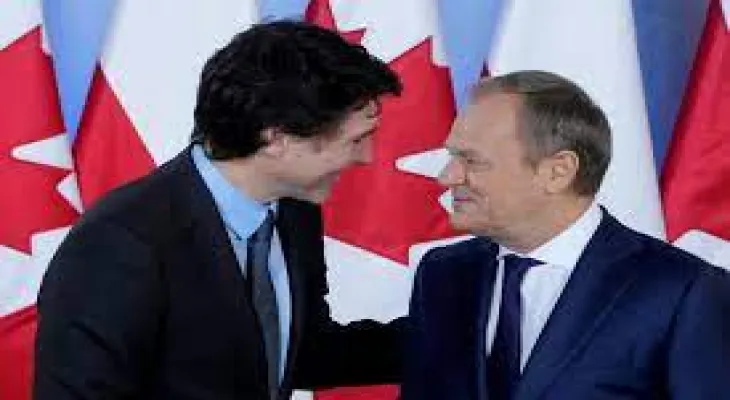Search here
Newspaper
Search here

Arab Canada News
News

Published: February 26, 2024
Polish Prime Minister said on Monday at the end of his meeting in Warsaw with his Canadian counterpart that all NATO members will eventually have to fulfill their commitment to spend 2 percent of their GDP on defense.
While praising Canada as one of "Poland's best allies," Donald Tusk carefully avoided criticizing Prime Minister Justin Trudeau's refusal to publicly commit to the alliance standards – an agreement made by all 31 NATO members at the leaders' summit last summer in Vilnius, Lithuania.
Tusk said, "I do not want to break the rules of hospitality, but I am convinced that (achieving the goal) will happen sooner or later in every NATO member country."
Canada has been under increasing public pressure from allies – such as the United States and NATO Secretary General – to set a plan to achieve the 2 percent of GDP target. This may require the federal government to invest up to $18 billion annually in addition to nearly $28.9 billion already allocated.
Former U.S. President and potential Republican candidate Donald Trump said he would encourage Russia to "do whatever the hell it wants" with NATO countries that do not invest enough in defending themselves.
Tusk said the issue is not about responding to Trump's threats, but about fulfilling the guarantees allies have made to each other.
He added, "So the simplest answer is that we all, without exception, meet these requirements." "Not because some politicians want it or not. But because it is our commitment, so we must do it, and we know there is more to do."
In a message mostly directed at Poland's European allies, Tusk also said it is important for NATO countries to exceed Russia's defense capability.
Currently, Poland leads the Western alliance in terms of defense investment. It spends 3.9% of its GDP on the military establishment, a figure surpassing U.S. spending, which allocates nearly 3.5% of its economic output on defense, while Canada allocates 1.38 percent.
The Washington Post reported last year, citing leaked documents, that Trudeau told NATO allies that Canada would never reach the 2% target.
Standing next to Tusk on Monday, Trudeau held to his old statement that Canada is a strong supporter of NATO – it always shows up and has the seventh largest defense budget in the alliance – but he avoided making a specific commitment to reach the target, or even setting a plan to do so.
Trudeau said, "We know there is a lot we have to do and we are doing it," pointing to a series of recent Liberal government announcements about equipment, including the purchase of F-35 fighters from the United States.
Conservative leader Pierre Poilievre recently said his government, if elected, will work to meet the alliance standard, which was also pledged by former Prime Minister Stephen Harper's government in 2014, when allies originally shaped their response to Russia’s invasion of Crimea.
Slowing the pace of procurement
One of the biggest obstacles preventing Canada from reaching the NATO target is the slow pace of defense procurement.
During the 2019 federal elections, both Liberals and Conservatives pledged to reform the defense acquisition system.
The governing Liberals proposed the creation of a single government organization – Canadian Defense Procurement – "to ensure the delivery of Canada’s largest and most complex defense procurement projects on time and with greater transparency to Parliament."
On the other hand, the Conservatives pledged to "depoliticize" defense procurement and create a ministerial committee in addition to a Defense Procurement Secretariat within the Privy Council Office "to ensure priority projects progress on time and on budget."
Several defense experts say it comes down to successive governments being unable to deliver equipment on time and spend the funds allocated by Parliament, affecting Canada’s ranking in NATO in terms of spending.
Comments